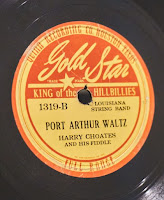Bosco Stomp, a remake of Delin T. Guillory and Lewis Lafleur's "Quelq'un est Jaloux", is a well-loved standard showpiece, common to the repertoire of Walker's contemporary and rival, Octa Clark.2
 |
| Crowley Daily Signal, Oct 1949 |
Ça, ça m'fait du mal.
Oh, bébé, ça m'fait du mal.
Oh, haha!(Il) y a des 'tites blondes,(il) y en a des 'tites brunes.Il y en qu'est assez noires que moi j'peux pas aimer,I(ls) vont t'faire des accroires,I(ls) vont faire des promesses,I(ls) vont t'faire ouais t'aimer et là ça te tourne le dos.Ah, U.J., yeah, alright.Ah yeah, oh, come on baby.Ça, ça m'fait du mal.Petite, rappelle-toi,Tous les misères tu m'as fait,Tu mens tout ce qui peux,Que moi je peux p(l)us t'aimer.
 |
| Uray Jules "U.J." Meaux |
Working with Lake Charles record producer, George Khoury, Lawrence gathered up his band Valmont "Jr." Benoit on steel guitar, Demus Comeaux on rhythm guitar, Lawrence Trahan on drums, and Uray Jules "U.J" Meaux on fiddle. Together, they recorded "Bosco Stomp" (#616) in 1951. A lively piece, you can clearly hear Lawrence call out "U.J." midway through the song. A popular tune with his contemporary Aldus Roger, store owner Bosco Prejean was Aldus' wife's step-grandfather. The entire family grew up in the area and recalled the drunken brawls and bloody fights that locals encountered in the rough and tumble Marais Bouleur side of Bosco.
What's done is terrible.
Oh, baby, what's done is terrible.
Oh, haha.There are little blondes,There are little brunettes,There are some dark haired ones, that I don't like,They're going to make you believe falsely,They will make promises,They will make you, yeah, love them, and like that, turn on your back.Ah, U.J. yeah, alright.Ah yeah, oh, come on baby.What's done is terrible.Little one, remember,All the miserable things you've done to me,You lie all that you can,Therefore, I can't love you anymore.
As WWII wound down, Walker was one of the first accordionists to return the instrument to prominence--but not in the old style. His band, the Wandering Aces, fused the string band format with a heavy steel guitar sound with the drive of the accordion. The result was a brash new sound that came to be labeled "dance-hall".2,3 Once Walker's recording his the jukeboxes, the popularity took off. For decades, Cajun and zydeco bands found ways to incorporate the song into their repertoire in order to keep the audience dancing. In 1963, Doug Kershaw reworked the melody into the "Cajun Stripper".
- Francois (Yé Yaille Chère!), 1990; pgs. 346-347
- Discussion with Neal P
- "Accordions, Fiddles, Two Step & Swing: A Cajun Music Reader" by Ron Brown, Ryan A. Brasseaux, and Kevin S. Fontenot
- Lyrics by Stephane F
Release Info:
Waltz Of Sorrow | Khoury's KH 616-A
Bosco Stomp | Khoury's KH 616-B
Find:
Cajun Honky Tonk: The Khoury Recordings, Volume 1 (Arhoolie, 1995)
Cajun Champs (Arhoolie, 2005)

















